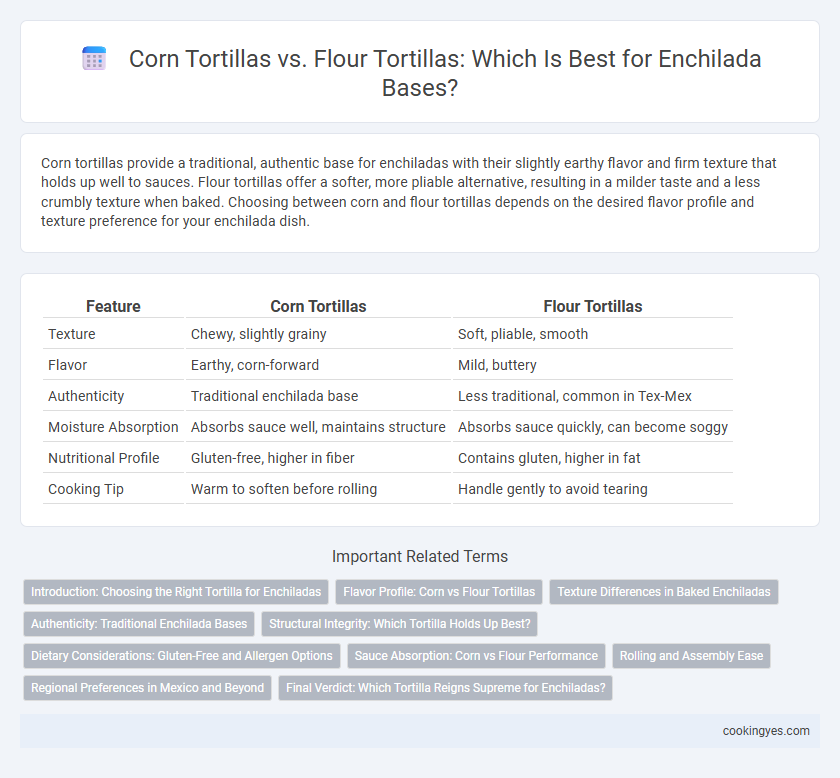Corn tortillas provide a traditional, authentic base for enchiladas with their slightly earthy flavor and firm texture that holds up well to sauces. Flour tortillas offer a softer, more pliable alternative, resulting in a milder taste and a less crumbly texture when baked. Choosing between corn and flour tortillas depends on the desired flavor profile and texture preference for your enchilada dish.
Table of Comparison
| Feature | Corn Tortillas | Flour Tortillas |
|---|---|---|
| Texture | Chewy, slightly grainy | Soft, pliable, smooth |
| Flavor | Earthy, corn-forward | Mild, buttery |
| Authenticity | Traditional enchilada base | Less traditional, common in Tex-Mex |
| Moisture Absorption | Absorbs sauce well, maintains structure | Absorbs sauce quickly, can become soggy |
| Nutritional Profile | Gluten-free, higher in fiber | Contains gluten, higher in fat |
| Cooking Tip | Warm to soften before rolling | Handle gently to avoid tearing |
Introduction: Choosing the Right Tortilla for Enchiladas
Corn tortillas provide an authentic, slightly sweet, and earthy base that holds up well to rich enchilada sauces without becoming soggy. Flour tortillas offer a softer, more pliable texture with a mild flavor, often preferred for milder fillings or when a thicker wrap is desired. Selecting between corn and flour tortillas impacts the overall taste and texture, making it essential to consider the enchilada style and sauce compatibility.
Flavor Profile: Corn vs Flour Tortillas
Corn tortillas deliver a distinct earthy and slightly sweet flavor that enhances the traditional taste of enchiladas, offering an authentic Mexican experience. Flour tortillas provide a milder, more neutral taste with a soft, chewy texture, allowing the fillings and sauces to stand out more prominently. The choice between corn and flour tortillas significantly influences the overall flavor profile, with corn tortillas adding depth and complexity while flour tortillas contribute subtlety and softness.
Texture Differences in Baked Enchiladas
Corn tortillas create a traditional enchilada with a denser, slightly grainy texture that softens yet holds structure when baked, absorbing sauces effectively without becoming overly mushy. Flour tortillas offer a softer, chewier consistency with a smoother surface that results in a less distinct texture contrast but a more pliable enchilada that can feel more bread-like after baking. The choice between corn and flour tortillas significantly impacts the overall mouthfeel, where corn imparts an authentic, rustic bite and flour provides a tender, doughier finish.
Authenticity: Traditional Enchilada Bases
Authentic enchiladas traditionally feature corn tortillas, which provide a distinct earthy flavor and a sturdy texture ideal for absorbing rich chili sauces without becoming soggy. Corn tortillas are made from nixtamalized maize, a process that enhances nutritional value and imparts the characteristic aroma essential to genuine Mexican cuisine. Flour tortillas, while softer and more pliable, are typically associated with northern Mexico and Tex-Mex variations, making corn tortillas the preferred choice for preserving traditional enchilada authenticity.
Structural Integrity: Which Tortilla Holds Up Best?
Corn tortillas exhibit superior structural integrity for enchiladas due to their firm yet pliable texture, which resists tearing and sogginess when baked or sauced. Flour tortillas tend to be softer and more prone to becoming soggy, compromising the enchilada's shape and making them less ideal for heavy fillings or rich sauces. Culinary experts often prefer corn tortillas as they maintain form and deliver authentic flavor, enhancing the overall enchilada experience.
Dietary Considerations: Gluten-Free and Allergen Options
Corn tortillas serve as the ideal base for enchiladas when prioritizing a gluten-free diet, as they are naturally free from gluten and suitable for those with gluten sensitivities or celiac disease. Flour tortillas, often containing wheat flour, pose a risk for individuals with gluten allergies or intolerances, limiting their suitability in allergen-conscious meal planning. For allergy-friendly enchilada preparations, corn tortillas provide a safer alternative, ensuring compliance with gluten-free dietary requirements and reducing exposure to common allergens.
Sauce Absorption: Corn vs Flour Performance
Corn tortillas excel at sauce absorption due to their porous texture, enhancing the overall flavor of enchiladas by soaking up rich, spicy sauces like red chile or mole. Flour tortillas, with their denser and less absorbent composition, tend to repel sauce, often resulting in a less integrated taste experience. Choosing corn tortillas maximizes sauce retention, ensuring each bite is moist and flavorful, which is essential for authentic enchilada dishes.
Rolling and Assembly Ease
Corn tortillas offer better flexibility and are less prone to tearing during rolling and assembly of enchiladas due to their traditional use and moisture retention techniques. Flour tortillas tend to be thicker and more elastic but can become too soft or sticky, making them harder to roll tightly without cracking or sticking. For a seamless enchilada preparation, corn tortillas soaked briefly in sauce maintain pliability, ensuring easier handling and a classic texture.
Regional Preferences in Mexico and Beyond
Corn tortillas dominate as the traditional base for enchiladas in most Mexican regions, especially in central and southern states like Oaxaca and Puebla, where their distinct texture and flavor complement rich mole sauces. Flour tortillas gain popularity in northern Mexico and some Tex-Mex variations in the United States, favored for their soft, pliable nature that holds fillings well. Regional preferences deeply influence enchilada preparation, with corn tortillas linked to authenticity and heritage, while flour tortillas cater to contemporary tastes and vary with local culinary influences.
Final Verdict: Which Tortilla Reigns Supreme for Enchiladas?
Corn tortillas hold the crown for authentic enchiladas due to their traditional flavor, superior texture, and ability to absorb rich sauces without becoming soggy. Flour tortillas, while softer and more pliable, often lack the distinctive taste and structural integrity that corn tortillas provide when baked or fried. For true enchilada enthusiasts seeking a balance of authenticity and durability, corn tortillas remain the definitive choice.
Corn tortillas vs flour tortillas for enchilada base Infographic

 cookingyes.com
cookingyes.com